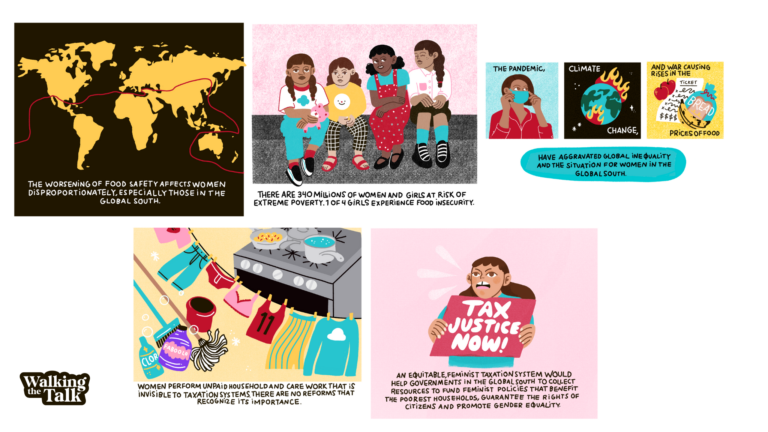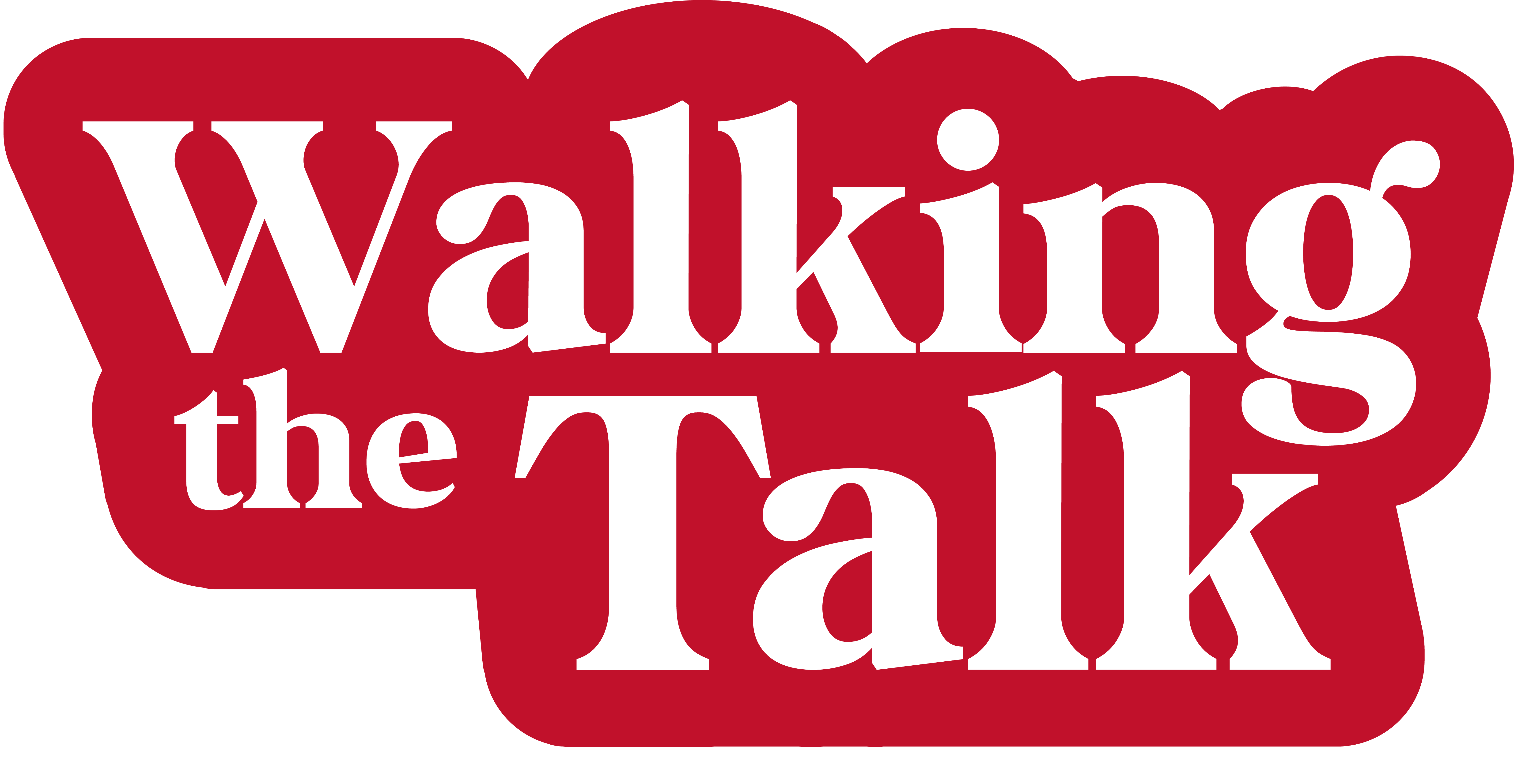The feminist funding landscape is experiencing seismic shifts, risking the reversal of hard-won gains on gender equality. Official Development Assistance (ODA) cuts are having a massive impact on women’s rights organizations globally. For example, a recent survey by UN Women warns that half of the surveyed women’s rights and women-led organizations in the humanitarian sector may be forced to shut down within six months, cutting off vital, life-saving support for millions. Ahead of the fourth United Nations Conference on Financing for Development, the Architecture of Change: Feminist Pathways to Financing Gender Equality Compendium highlights why feminist movements must be funded, how current financing systems can be reimagined to benefit everyone, and what feminist-led solutions already exist. At a time when global development frameworks are being reassessed, these insights offer concrete, inclusive alternatives that address systemic inequalities head-on.
The compendium brings together 13 research papers answering critical questions about the future of financing feminist futures globally. The first – Why is funding feminist movements essential? – makes a powerful case for sustained, meaningful investment in feminist actors, especially youth-led and grassroots groups, by highlighting the risks of defunding and the critical role these movements play in advancing gender equality. The second – How can we reimagine alternative funding models for feminist organizing? – explores innovative, locally grounded approaches to resourcing feminist work, including climate-aligned financing, family philanthropy, caste-conscious funding, and municipal budget reform. The final question – How can we rebuild fairer financial systems? – offers a systemic critique of global financial structures and calls for feminist, justice-driven alternatives such as gender-responsive debt relief, equitable trade agreements, and progressive tax reforms.
Together, these research papers provide a roadmap for transforming how feminist movements are resourced. These are not distant, detached academic reflections. They are rooted in movement, memory, and resistance. 39 authors write from the ground, focusing on more than 30 countries: from Dalit feminist collectives reclaiming health rights, to African coalitions challenging debt colonialism, to queer organizers demanding bodily autonomy in hostile political climates. Their knowledge is forged in struggle, sharpened by urgency, and infused with a fierce determination to reimagine a more just world. At a time when inclusive policies are being defunded and the political landscape is growing increasingly exclusionary and violent, these contributions represent a collective act of defiance and a roadmap for building a just and sustainable future together. This collection serves as a potent reminder that transformation is not an abstract concept – it is already in motion.

These papers establish a clear, evidence-based argument for why feminist movements must be funded consistently and meaningfully. Through research from contexts like Bangladesh, Zimbabwe, Turkey, and South Sudan, it shows that defunding feminist organizations leads to shrinking civic space, increased repression, and stalled progress on gender equality. It highlights how young feminist groups, despite being critical drivers of social change, remain vastly under-resourced and face unique barriers such as political instability and the digital divide. The featured research papers illustrate the tangible consequences of funding cuts, and the urgent need to protect and expand financial support for feminist actors worldwide.
Redefining risk: What happens when feminist movements are not funded or ‘defunded’ and their civic space narrowed or closed?
The paper examines funding in four countries; Bangladesh, Nicaragua, Turkey and Zimbabwe highlighting how funders perceive funding feminist movements as risky. The researchers flip this narrative and look into the risk to gender equality and larger development goals there are when feminist movements are not funded. In the focus countries, the reduction in gender equality funding led to shrinking civic space. The researchers posit that when funding reduces, there is increased repression and shrinking civic space. Additionally, gender equality measures stagnate or decrease. The paper is unique in that it clearly analyses the implications of defunding of Women’s Rights Organizations (WRO). At a times of increased budget cuts, this research makes a compelling case for the continued funding of WROs.
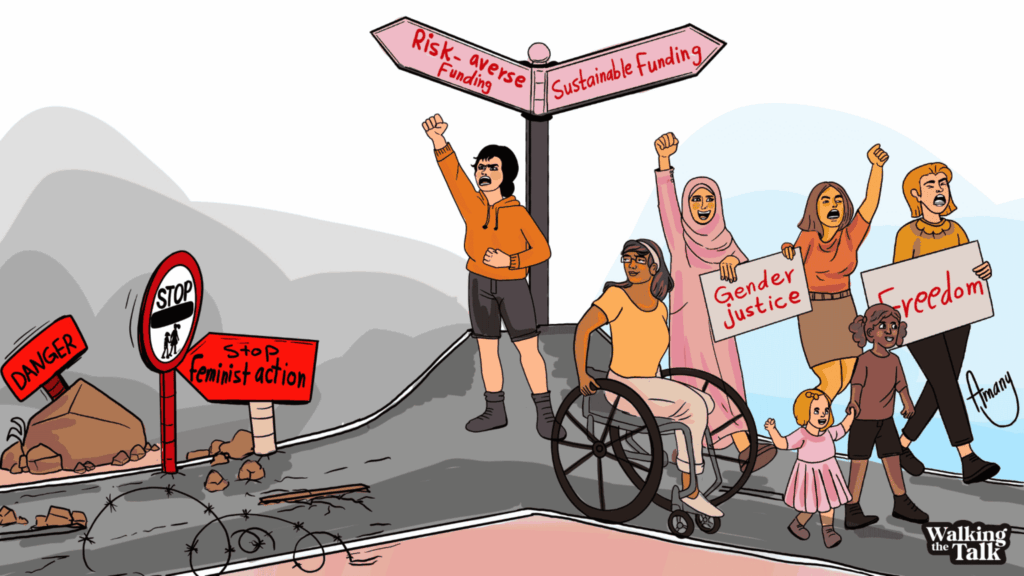
Bridging the Gap: Empowering Youth Feminist Organizations
The paper highlights the central role played by young feminist movements in the promotion of gender equality and eradication of Gender Based Violence. It focuses on Zimbabwe, South Sudan and Tunisia. Young feminists use youth and community driven approaches, mobilize communities, challenge oppressive structures and champion inclusive policies. Yet, political instability, restrictive laws, the digital divide, technical capacity gaps and low funding affect their impact. The paper calls for the creation of alternative funding models and collaborative partnerships to ensure the sustainability of Youth Feminist Organizations (YFO). This paper highlights the need for funding youth movements, particularly feminist youth movements.
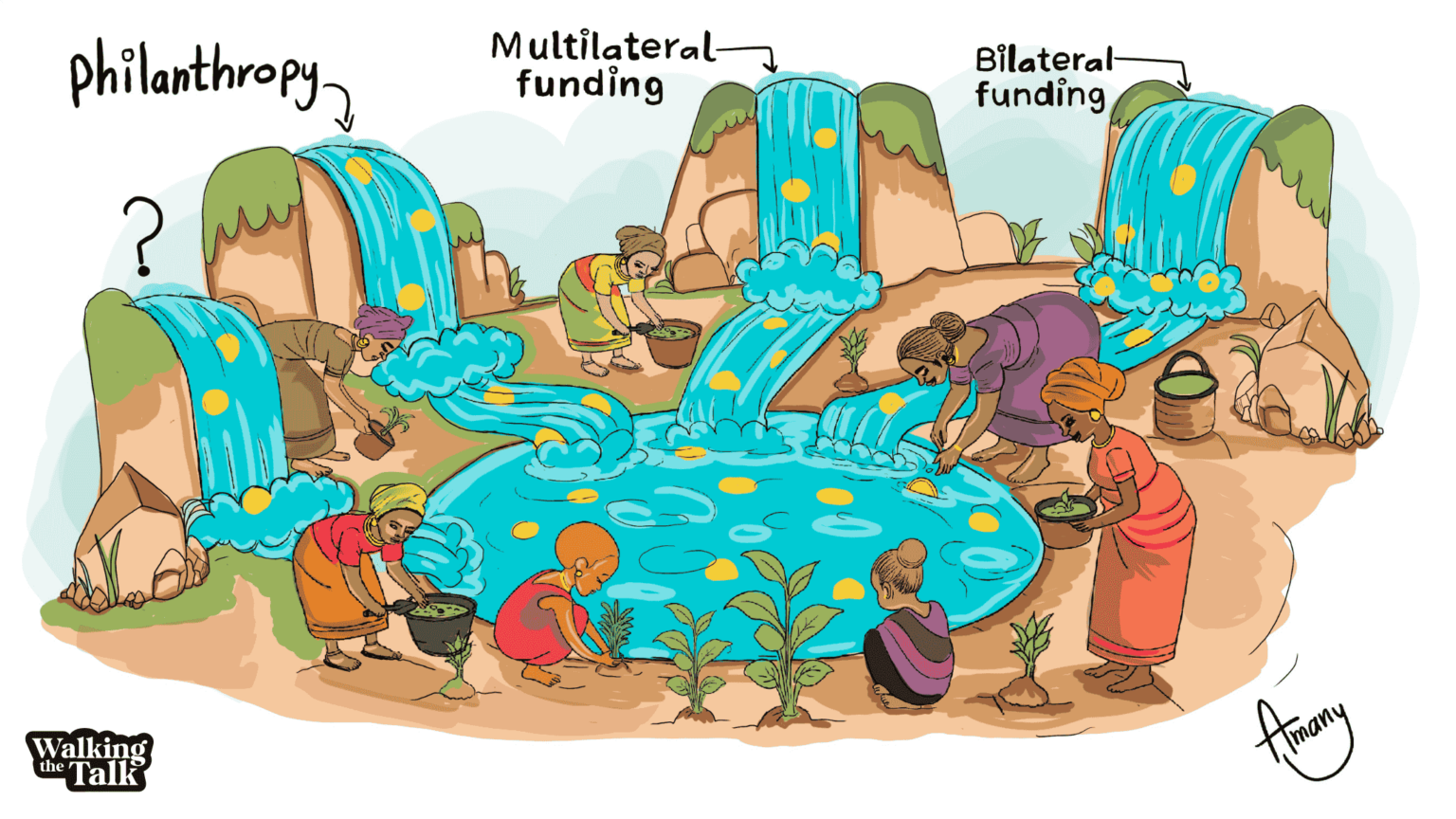

The following papers focus on practical, context-specific alternatives to traditional development funding. It presents a range of innovative and inclusive financing models. These cover topics from integrating feminist principles into climate adaptation funding and aligning corporate social responsibility with feminist goals, to promoting family philanthropy in India and creating collaborative funding ecosystems in Türkiye and Central Africa. The research also advocates for recognizing intersectional realities, such as caste-based oppression within Dalit feminist movements, and calls for local public financing (as seen in Benin) to support gender equity at the municipal level. These papers showcase actionable funding approaches that center justice, sustainability, and local leadership, offering concrete solutions to the limitations of current donor frameworks.
How Climate Response and Mitigation Financing Intersect with Feminist Funding
The research calls for the regulation of governments and corporations in climate responsiveness. It further highlights the importance of integrating gender equity into climate adaptation financing based on equitable participation from local and grassroots organizations/movements. Climate adaptive and responsive funding is high yet a low percentage of foundation grants got to Women’s rights movements. The authors highlight that Corporate Social Responsibility present an opportunity/ alternative to existing funding models. Existing CSR models fail to integrate gender equality. As a solution, the researchers suggest the alignment of international and philanthropic donors with CSR frameworks and government strategies ensuring more effective and sustainable Public-private partnerships. This paper is important in that it focuses on the importance of strategy alignment and greater collaboration between different funders. Can countries create local funding pools with CSR funds, government and international funders?

An Evidence-Based Approach to Adopting the GEDI Lens among Women and Queer-Represented Family Philanthropy in India and South Asia
The paper analyses the family philanthropy landscape in India and South Asia highlighting that Indian families focus primarily on education and health funding. There are limited funds dedicated to gender equity and feminist movements. Because of the restrictions in foreign funding and CSR giving, family philanthropy emerges as an alternative for long-term resourcing towards gender equity. However, a new generation of more inclusive and transformative family philanthropists is stepping up. The authors propose a GEDI framework to guide family philanthropists on funding strategies that are gender intentional and intersectional. This research highlights family philanthropy as a viable alternative to ODA funding.

Illustrated by Sanitarypanels
Reimagining Dalit Feminist-Led Caste Equity In South Asia Pathways for Sustained Funding & Movement-building
The paper analyses the intersectionality within Dalit feminist movements in South Asia. The researchers call for funding and philanthropy which recognizes the multiple layers of oppression and understands intersecting hierarchies.it is particularly important to analyze caste-equity and use an anti-caste lens when allocating funds to indigenous feminist movements. The researchers recommend implementing collaborative funds, understanding caste based structures and investing in long-term, sustained social change. This paper brings in a different dimension as it looks at how community centered funding should consider the power dynamics within specific countries and communities rather than look at feminists in a specific country as homogenous. It can be used when conducting advocacy with funders focusing on developing contextually relevant and intersectional funding models.
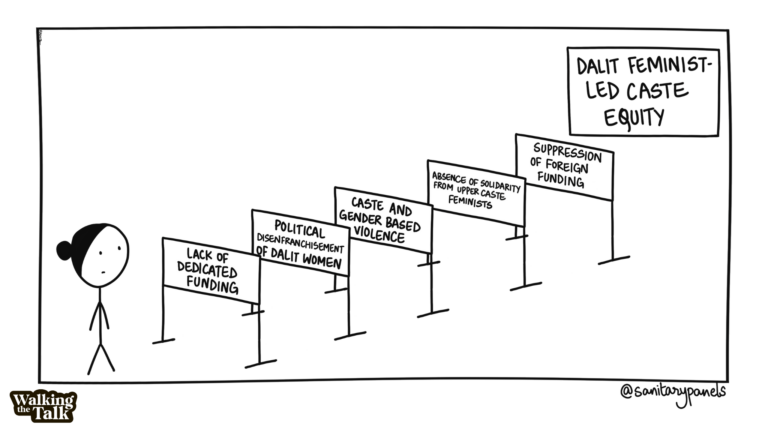
Illustrated by Sanitarypanels
The Feminist Public Financing Ecosystem in Central Africa: Status, Challenges and Prospects for Transformation
The paper highlights the fragility of the funding ecosystem in the Central African region focusing on Cameroon, Chad and the Democratic Republic of Congo. The researchers found that feminist funding at the national, regional and international levels depends principally on organizations relationships with public funders. Nationally, most funders focus on technical support while those with feminist foreign policies (FFP) do not implement the policy fully when funding local organizations. The paper concludes that improving the ecosystem is a shared responsibility between funders and feminist movements.
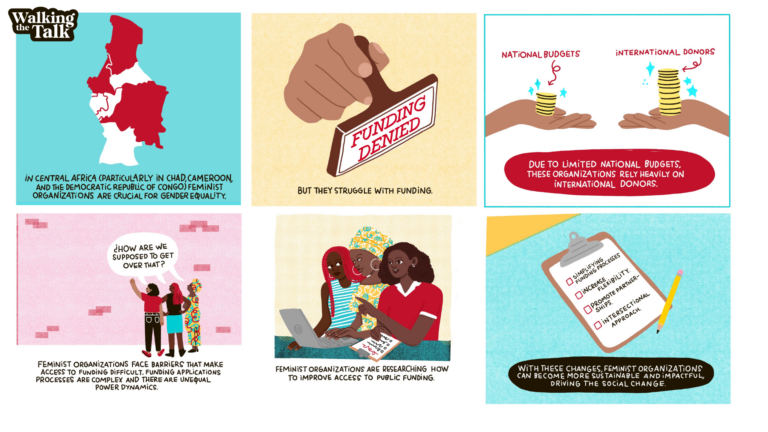
Building Transformative, Collaborative, Feminist and Accountable Funding Ecosystems for Feminist Organizations in Türkiye
Turkish feminist organizations struggle with financial and structural challenges – international and domestic support have declined while political restrictions persist. The paper also highlights that ODA funding is dwindling and unpredictable. There is limited private sector funding of feminist movement. Corporate social responsibility (CSR) funds fail to address structural inequalities. The paper posits building a long-term, transformative, collaborative, feminist and accountable funding ecosystem. Advocacy can focus on increasing ODA funding and ensuring a conducive ecosystem for feminist organizations.
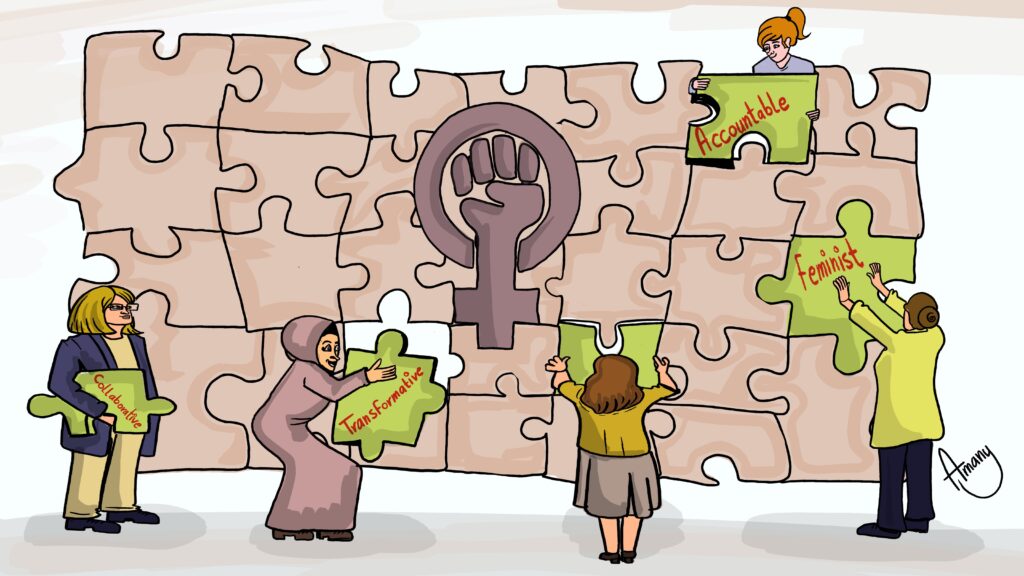
Decolonizing foreign funding policies from localized contexts in Kenya, India and Bangladesh: A transnational study
The research challenges colonial legacies in foreign development funding policies which perpetuate structural inequities and patriarchal violence in the majority world particularly in Kenya, India and Bangladesh. The authors challenge donor imposed priorities which limit organizational autonomy and promote western frameworks at the expense of southern feminist voices. The core argument of the research is that minority world countries promote feminist foreign policies while simultaneously advancing their own political agendas, often overlooking intersectional issues like caste and gender. There is a need to promote reparative justice models as opposed to colonial funding structures. Advocacy can focus on challenging development assistance which advances economic interests.
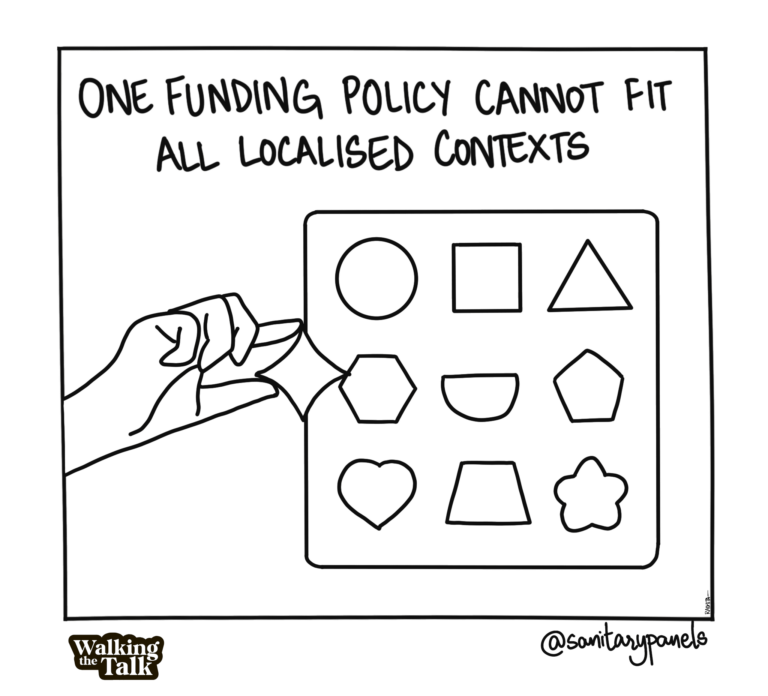
Towards Feminist Philanthropy: A Global Majority-Led Solution for Bridging the Needs of Activists and Interests of Donors in a Changing Political Context
The research focuses on Latin America, South West Asia and North Africa and highlights the administrative, ethical and political challenges in managing funds for gender justice organizations. The paper highlights the tension between grassroots activism and professionalization of organizations often demanded by donor agendas. The financial instability, short funding cycles and lack of coverage for living wages compromise the sustainability of gender justice organizations. Organizations usually align their political views with donor agendas in order to secure funding, compromising their ideological grounding. The paper proposes initiating self funding strategies for sustainability and providing flexible, long term unrestricted funding. It can be used to lobby donor agencies and governments to shift power to grassroots movements, allowing them to define their priorities.
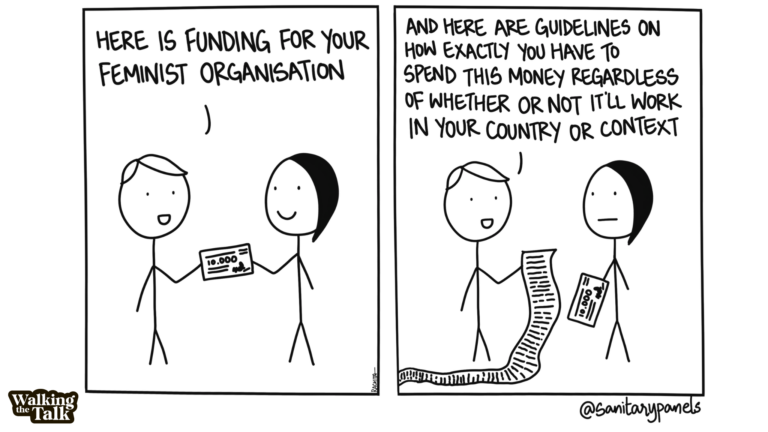
The importance of local public financial resources in improving women’s roles in society
The research was done in Benin and analyses how the public sector can finance feminist movements and work around gender equality. Benin has a de-centralized governance structure allowing local authorities to develop budgets. However, funding for women’s rights from local councils has traditionally been low affecting feminist movements and women’s rights organizations. The advocacy call from this paper is for local authorities to deliberately include gender and women’s rights in their budgets.
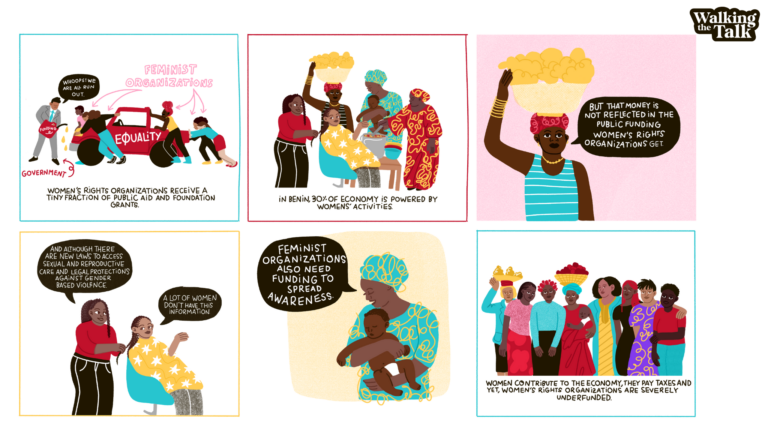

The following papers challenge the global financial systems that reinforce colonial legacies and gender inequality, calling for feminist-led, justice-driven alternatives. It examines how restrictive donor agendas, exploitative trade agreements, and regressive fiscal policies undermine feminist organizing, particularly in the Majority World. Research highlights include the need for gender-just debt relief, the application of decolonial feminist foreign policy in African trade agreements, and progressive tax reforms to fund inclusive public services. These papers offer a critical perspective on how to restructure financial systems to prioritize equity, autonomy, and long-term investment in feminist futures.
How can Debt2Health initiatives be optimized to effectively promote gender equality and empower feminist movements in East Africa?
The research looks at colonial legacies in debt repayment highlighting that the debt crisis experienced in most Majority World countries, disproportionately affects women, girls and gender diverse individuals. Debt repayments are often done at the expense of public health initiatives which affect women and girls’ health. Debt relief mechanisms implemented by monetary institutions are gender blind. The paper suggests implementing debt forgiveness and restructuring which promotes and upholds gender justice. It calls for debt servicing through investment in social services. This paper is a great tool to advocate for debt forgiveness and restructuring by monetary institutions based on a commitment from Majority World countries to invest the resources in social services.
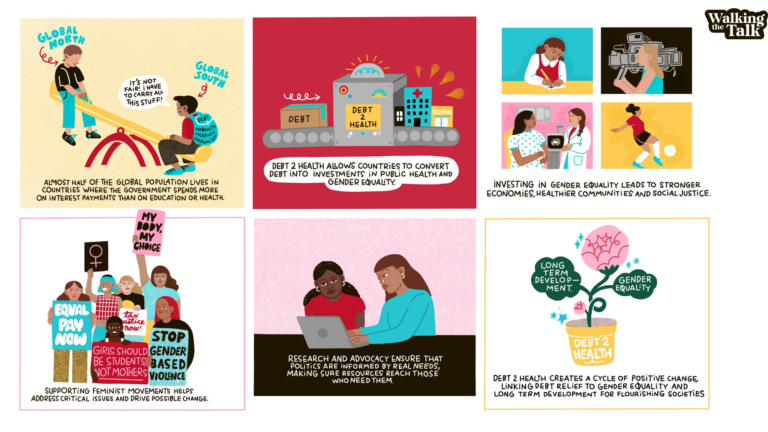
Decolonizing Feminist Foreign Policy for Economic Justice in Free Trade Agreements – Case of Africa Continental Free Trade Area
The paper highlights that decolonizing Feminist Foreign Policies (FFPs) will lead to economic justice. The researchers point out the importance of using a decolonial FFP framework to ensure gender equity and economic empowerment in the African Continental Free Trade Area (AFCTA) which is currently under implementation. Part of this includes centering the needs and expectation of women working in the informal economy. In Africa, the majority of women work in the informal economy. Minority World governments must ensure inclusive, non-exploitative trade agreements in collaboration with African feminists.
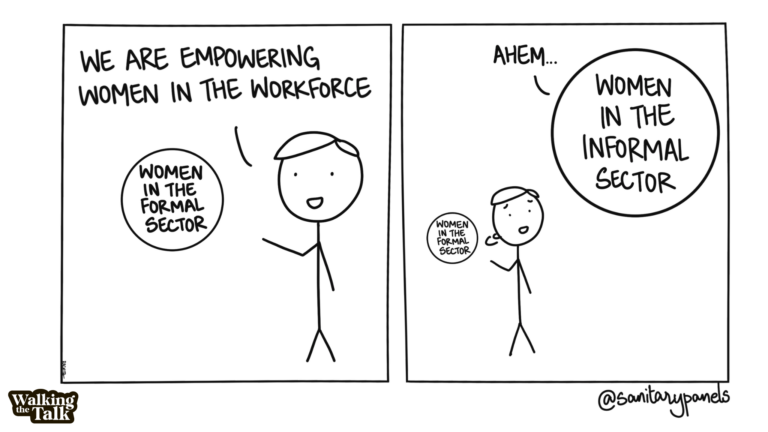
Creating fiscal space to secure funding for feminist policies
Guidelines for promoting fiscal reform in Latin America
The paper focuses on Mexico and Argentina highlighting austerity measures, such as unequal tax systems and skewed income redistribution, which affect gender equality. These measures also lead to increasing the burden of care on women. The researchers emphasize how limited participation of women and the LGBTQIA+ communities in budgeting processes leads to the de- prioritization of their needs in the final budgets. The researchers recommend promoting progressive fiscal space for governments to fund feminist public policies.
